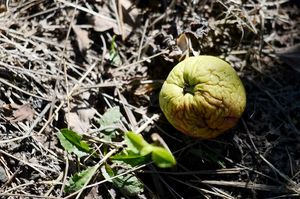As climate change takes hold, Michigan's orchards may increasingly fall victim to the spring thaw-and-freeze pattern that devastated fruit crops last year, scientists said Tuesday.
The grim prognosis is part of a broader evaluation of the likely effects of a warming climate being developed by federal and university scientists. It predicts that more intense flooding, heat stress, drought and other extreme weather will take a toll on Midwestern agriculture.
"The trends we're observing are a bit disturbing," Jeff Andresen, Michigan's state climatologist, said during a conference in Ann Arbor where he and other experts outlined the latest findings of the National Climate Assessment, which integrates the most recent scientific research on climate change and is updated every four years. A draft is being circulated for public review.

A shriveled apple at Wasem Fruit Farm last year. The orchard near Milan lost most of its apple crop to the wild weather last spring.
Melanie Maxwell | AnnArbor.com
Michigan's climate and geography have long been ideal for orchard crops thanks to the Great Lakes, which moderate winter temperatures and provide a protective layer of snow.
But last year's wipeout because of early warming and later freezes was the second in a decade, and the report says more may be coming.
"When you ask growers about these 'train wreck' seasons, most say they previously considered them as something that might happen once in a lifetime if at all," Andresen said in a phone interview. "But something is changing. The seasonal warm-up is happening earlier. For tree fruits that is a very bad thing."
Other crops such as corn and soybeans are flourishing in Michigan as the growing season lengthens, although their improving productivity also results from better technology, he said. The report says that while climate change will cause some crops and livestock to fare better over the next 25 years, eventually all types of agriculture will suffer.
"We can't lose sight of the fact that there's only a certain amount that we can do to adapt," said Don Scavia, a University of Michigan climate change specialist. "In the long term, we need to reduce the carbon dioxide and other greenhouse gas emissions."
As droughts become more frequent and prolonged, ever-scarcer rainfall will happen during fierce storms that flush phosphorus and other nutrients into the Great Lakes, Scavia said. Such runoff harms water quality, promoting runaway algae blooms and oxygen-starved "dead zones."